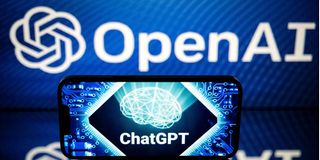Digital world: Navigating the AI revolution with optimism

Academic integrity has been significantly affected by the advent of Chat GPT.
What you need to know:
- Artificial Intelligence is trained through human practices, and if we are not ready to be fair, honest, and make ethical decisions, AI may lead us astray.
- As AI implementation and adoption progress, new regulations will be necessary at the institutional and national levels to ensure safety, prevent misuse, and protect jobs when necessary.
The OECD recently announced that 27 per cent of jobs in major countries rely on advanced skills that could be easily automated in the midst of the AI revolution. It is important to acknowledge that while AI will undoubtedly change the way we work, it does not necessarily mean that it will replace all aspects of high-skilled jobs. However, in order to ensure that AI does the right thing, society must prepare itself to deal with the implications.
Artificial Intelligence is trained through human practices, and if we are not ready to be fair, honest, and make ethical decisions, AI may lead us astray. There is an increasing need for individuals and institutions to learn and adapt to new emerging technologies, regardless of their profession or sector.
It is crucial to understand how these new technologies work in order to maximise their benefits for both individuals and institutions. Failure to do so may result in being left behind while others excel in leveraging these technologies. While many tasks may be automated by emerging technologies, not all tasks will be replaced.
Professionals who engage with and leverage these emerging technologies will hold the most value in the years to come. Instead of worrying about job security, it is better to allocate time to understand and leverage these technologies.
Our education system may need to adapt its curriculum to incorporate the use of emerging technologies. Additionally, it should prepare the new generation with skills such as emotional intelligence and critical thinking, which are not easily replaceable by AI.
Ethical values are also of utmost importance, as professionals using these tools may cause harm if ethical considerations are not integrated into education.
For example, Academic Integrity has been significantly affected by the advent of Chat GPT, and the Aga Khan University (AKU), where I am based, has consequently updated its academic integrity guidelines to discuss appropriate and non-appropriate uses of AI for student assignments.
Although the nature of jobs may change, it does not necessarily mean that they will be completely replaced by AI. Many roles may shift towards leveraging and interpreting AI-driven analysis, but ultimately, human empathy and compassion will still be vital.
If high-skilled jobs are automated, it may result in an increase in income inequality, as the benefits of AI are not evenly distributed. This may also widen the digital divide between countries that can afford to implement AI and those that cannot. Therefore, early adoption of emerging technologies at the individual, institutional, and national levels can help leverage the benefits of implementing AI and other emerging technologies.
As AI implementation and adoption progress, new regulations will be necessary at the institutional and national levels to ensure safety, prevent misuse, and protect jobs when necessary. We must recognise that these technologies are here to stay, and AI will play a significant role.
They can make profound changes in resource-constrained contexts. AKU has recently implemented an AGFA PACs system that undertakes AI-assisted analysis of radiology scans. The AI-assistant functions like a ‘helper’ that has read and analysed thousands of scans before giving an initial assessment to a radiology professional.
Understandably, these innovations can exacerbate income inequality, as AI begins to perform tasks that traditionally commanded high salaries. By better preparing ourselves, we can become leaders in the new world of artificial intelligence. The world will require many professionals to guide the implementation of AI and other emerging technologies on institutional, national, and international levels. With better planning, this challenge can be transformed into an amazing opportunity.
The writer is the Global Chief Information Officer, Aga Khan University





